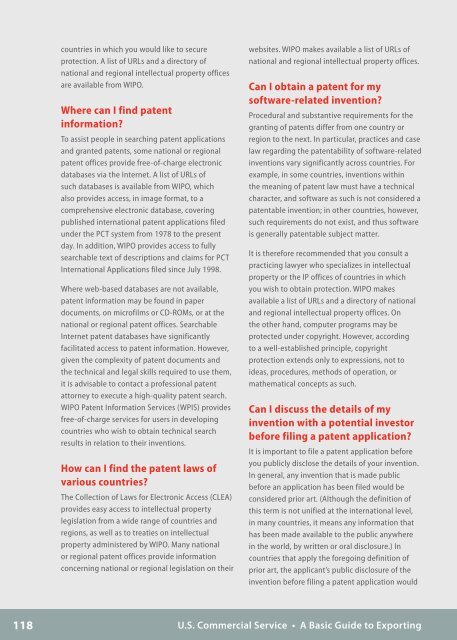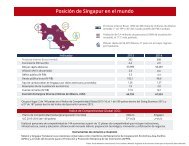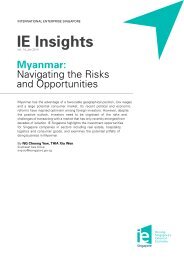basic-guide-to-exporting_Latest_eg_main_086196
basic-guide-to-exporting_Latest_eg_main_086196
basic-guide-to-exporting_Latest_eg_main_086196
Create successful ePaper yourself
Turn your PDF publications into a flip-book with our unique Google optimized e-Paper software.
countries in which you would like <strong>to</strong> secureprotection. A list of URLs and a direc<strong>to</strong>ry ofnational and r<strong>eg</strong>ional intellectual property officesare available from WIPO.Where can I find patentinformation?To assist people in searching patent applicationsand granted patents, some national or r<strong>eg</strong>ionalpatent offices provide free-of-charge electronicdatabases via the Internet. A list of URLs ofsuch databases is available from WIPO, whichalso provides access, in image format, <strong>to</strong> acomprehensive electronic database, coveringpublished international patent applications filedunder the PCT system from 1978 <strong>to</strong> the presentday. In addition, WIPO provides access <strong>to</strong> fullysearchable text of descriptions and claims for PCTInternational Applications filed since July 1998.Where web-based databases are not available,patent information may be found in paperdocuments, on microfilms or CD-ROMs, or at thenational or r<strong>eg</strong>ional patent offices. SearchableInternet patent databases have significantlyfacilitated access <strong>to</strong> patent information. However,given the complexity of patent documents andthe technical and l<strong>eg</strong>al skills required <strong>to</strong> use them,it is advisable <strong>to</strong> contact a professional patentat<strong>to</strong>rney <strong>to</strong> execute a high-quality patent search.WIPO Patent Information Services (WPIS) providesfree-of-charge services for users in developingcountries who wish <strong>to</strong> obtain technical searchresults in relation <strong>to</strong> their inventions.How can I find the patent laws ofvarious countries?The Collection of Laws for Electronic Access (CLEA)provides easy access <strong>to</strong> intellectual propertyl<strong>eg</strong>islation from a wide range of countries andr<strong>eg</strong>ions, as well as <strong>to</strong> treaties on intellectualproperty administered by WIPO. Many nationalor r<strong>eg</strong>ional patent offices provide informationconcerning national or r<strong>eg</strong>ional l<strong>eg</strong>islation on theirwebsites. WIPO makes available a list of URLs ofnational and r<strong>eg</strong>ional intellectual property offices.Can I obtain a patent for mysoftware-related invention?Procedural and substantive requirements for th<strong>eg</strong>ranting of patents differ from one country orr<strong>eg</strong>ion <strong>to</strong> the next. In particular, practices and caselaw r<strong>eg</strong>arding the patentability of software-relatedinventions vary significantly across countries. Forexample, in some countries, inventions withinthe meaning of patent law must have a technicalcharacter, and software as such is not considered apatentable invention; in other countries, however,such requirements do not exist, and thus softwareis generally patentable subject matter.It is therefore recommended that you consult apracticing lawyer who specializes in intellectualproperty or the IP offices of countries in whichyou wish <strong>to</strong> obtain protection. WIPO makesavailable a list of URLs and a direc<strong>to</strong>ry of nationaland r<strong>eg</strong>ional intellectual property offices. Onthe other hand, computer programs may beprotected under copyright. However, according<strong>to</strong> a well-established principle, copyrightprotection extends only <strong>to</strong> expressions, not <strong>to</strong>ideas, procedures, methods of operation, ormathematical concepts as such.Can I discuss the details of myinvention with a potential inves<strong>to</strong>rbefore filing a patent application?It is important <strong>to</strong> file a patent application beforeyou publicly disclose the details of your invention.In general, any invention that is made publicbefore an application has been filed would beconsidered prior art. (Although the definition ofthis term is not unified at the international level,in many countries, it means any information thathas been made available <strong>to</strong> the public anywherein the world, by written or oral disclosure.) Incountries that apply the for<strong>eg</strong>oing definition ofprior art, the applicant’s public disclosure of theinvention before filing a patent application would118U.S. Commercial Service • A Basic Guide <strong>to</strong> Exporting





